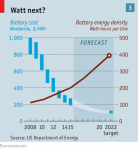Ian_Edwards
Well-Known Member
The problem with manufactures fuel consumption curves, is that they are all taken at maximum load, irrespective of the rpm.
However, the torque absorbed by a propeller is proportional to the rotational speed of the prop squared, so that the engine isn't normally running at full load. Ideally it only runs at full load at max hull speed (assuming a non planing hull) when the maximum torque the engine can develop matches the torque the prop can absorb. In practice the designer will match the max torque the engine can produce a little above the max prop torque at hull speed. This gives a little in hand for driving into a head sea and/or wind when the advance coefficient is lower.
The net result is that the engine's governor is throttled back to maintain the set rpm and the engine uses less fuel. It will only use the manufacturer's quoted fuel consumption at max speed.
For my boat with a water line length of 46ft, and a 48hp engine, I run at about 2L/hr at 6 knots and about 10L/hr a 9 knots, the max theoretical hull is about 9.5 knots.
As for diesel Electric Hybrid systems, they definitely work on larger vessels, most new ferries are diesel electric and offshore support vessels have been diesel electric for many years. I can see diesel electric in yachts being attractive to owners who normally day sails from marinas, which would allow them to charge up from the mains overnight and have a diesel for longer trips. However, retrofitting a big battery pack to an existing hull is probably a nonstarter. You'd have to figure out how to make best use of the mass of the batteries as ballast.
However, the torque absorbed by a propeller is proportional to the rotational speed of the prop squared, so that the engine isn't normally running at full load. Ideally it only runs at full load at max hull speed (assuming a non planing hull) when the maximum torque the engine can develop matches the torque the prop can absorb. In practice the designer will match the max torque the engine can produce a little above the max prop torque at hull speed. This gives a little in hand for driving into a head sea and/or wind when the advance coefficient is lower.
The net result is that the engine's governor is throttled back to maintain the set rpm and the engine uses less fuel. It will only use the manufacturer's quoted fuel consumption at max speed.
For my boat with a water line length of 46ft, and a 48hp engine, I run at about 2L/hr at 6 knots and about 10L/hr a 9 knots, the max theoretical hull is about 9.5 knots.
As for diesel Electric Hybrid systems, they definitely work on larger vessels, most new ferries are diesel electric and offshore support vessels have been diesel electric for many years. I can see diesel electric in yachts being attractive to owners who normally day sails from marinas, which would allow them to charge up from the mains overnight and have a diesel for longer trips. However, retrofitting a big battery pack to an existing hull is probably a nonstarter. You'd have to figure out how to make best use of the mass of the batteries as ballast.

